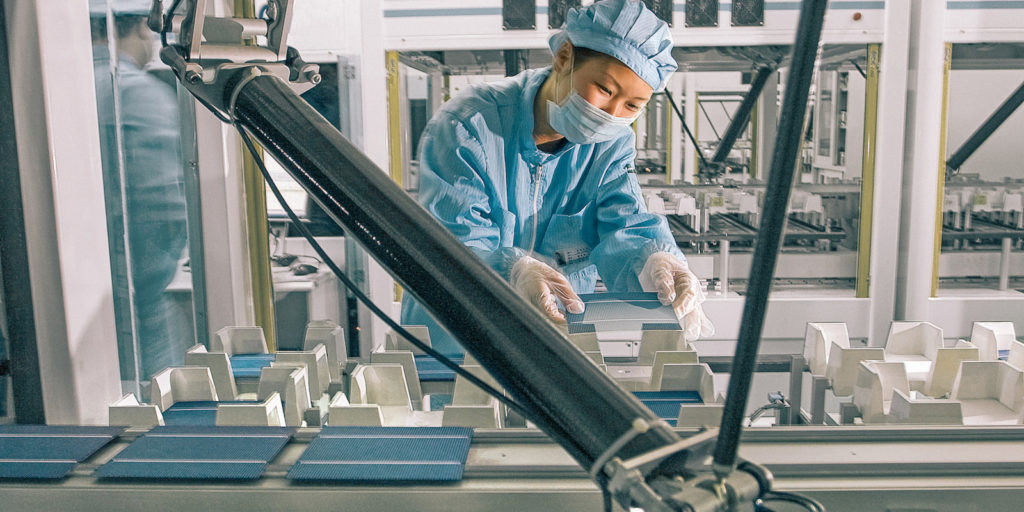Yingli Green Energy Holding Company Limited has released its 2017 financial results, which reveal a net loss of $510 million, up from the loss of $267.1 million recorded in 2016; and total liabilities of $3.2 billion or, minus the shareholder deficit, $1.6 billion. Meanwhile, it has just $58.1 million in net cash.
In Q4 2017, its net loss was $75.6 million, an improvement on the $354.9 million it lost in Q3.
In a statement, it wrote, “Given the Company’s financial position, substantial doubt exists as to the Company’s ability to continue as a going concern.”
Yingli is seeking a number of measures to hang onto its business, including the renewal or rollover of debt and the search for new investors via the special committee it announced at the start of last March.
“As of March 31, 2018, the lending banks conditionally agreed to renew or roll over RMB 1,702.8 million (US$261.7 million) out of RMB 10,407.0 million (US$1,599.5 million) of short-term borrowings outstanding as of December 31, 2017,” said Yingli.
It added that while it has persuaded many creditors to wait, two have filed lawsuits, against Tianwei Yingli (a principal subsidiary of Yingli) for RMB 74.4 million and the costs of the lawsuit; and Yingli China, for RMB 106.4 million. “The Company does not expect these lawsuits to have any direct material impact on its overall operation or liquidity position,” however.
While the outlook is – and has for several years now been – bleak, with talk of bankruptcy swirling the Chinese solar PV manufacturer for almost three years now, it remains optimistic, stating, “Based on the management’s comprehensive assessment on the Company’s operation and financial situation, the Company expects to continue to maintain the normal operation of its existing major subsidiaries, including their manufacturing, sales, procurement and other operational activities and matters.”
On a more positive note, module shipments have exceeded expectations, with Q4 recording a 40% increase QoQ, at 837.9 MW; and FY 2017 seeing just under 3 GW shipped, up 36% on 2016.
Despite the increase, FY net revenues fell slightly, from RMB 8,376.1 million in 2016, to RMB 8,363.7 million ($ 1.3 billion) in 2017.
“The slight decrease in total net revenues despite a significant increase in the shipments year-over-year was mainly due to the continuous decline of average selling price of PV modules throughout the Company’s major markets, including China and Japan and decrease in other revenues,” said Yingli.
FY gross profit and gross margin in 2017 were RMB 304.8 million ($46.8 million) and 3.6%, respectively, compared to RMB 1,151.9 million and 13.8% the year prior.
Yingli has not issued financial guidance for this year. In today’s statement, it did say it expects to ship between 400 and 420 MW of solar PV modules in Q1, however.
Fated
Yingli, briefly the world’s biggest solar PV module manufacturer in 2013 and 2014, and FIFA World Cup sponsor in 2014 – the first renewable energy and the first Chinese company to do so – has experienced troubled times over the past few years.
It first announced substantial doubt to continue as a going concern in its 2014 20-F filing. Since then, the manufacturer has struggled to regain a strong financial position.
Last year, it ranked as the seventh biggest manufacturer. Having fought to bring its utilization rate above 50% in 2016, the company formed a special committee last March to resolve its debt issues, and while it did appear to pay off some debts and reduce its losses, challenging conditions still prevailed.
“On top of the company’s ability to resolve debts, Yingli Solar is facing tough market conditions,” GTM Research’s Jade Jones told pv magazine last July, adding, “Excess supply and low prices are putting a lot of pressure on margins, and global demand growth will be moderate at best in the next few years. The market has seen the rise and fall of major PV manufacturers before, and current market conditions would not make a recovery easy.”
This content is protected by copyright and may not be reused. If you want to cooperate with us and would like to reuse some of our content, please contact: editors@pv-magazine.com.









By submitting this form you agree to pv magazine using your data for the purposes of publishing your comment.
Your personal data will only be disclosed or otherwise transmitted to third parties for the purposes of spam filtering or if this is necessary for technical maintenance of the website. Any other transfer to third parties will not take place unless this is justified on the basis of applicable data protection regulations or if pv magazine is legally obliged to do so.
You may revoke this consent at any time with effect for the future, in which case your personal data will be deleted immediately. Otherwise, your data will be deleted if pv magazine has processed your request or the purpose of data storage is fulfilled.
Further information on data privacy can be found in our Data Protection Policy.